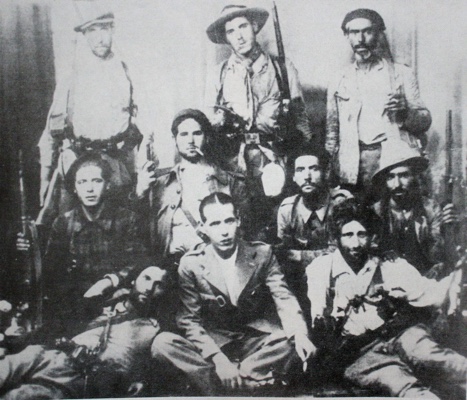Do Foreign Fighters Make Good Soldiers?

A unit of the Bulgarian International Brigade in the Spanish Civil War, 1937
Foreign fighters have been making international headlines almost continuously since 2013. A recent example is the announcement by Britain’s Home Secretary, Sajid Javid, that the UK government will not seek to block a death penalty for the two remaining members of the so-called Beatles gang. The two men, who are facing trial in the US, were part of a group of four British citizens who joined the Islamic State and are accused of torturing and executing prisoners. News regarding foreign fighters is not restricted to those who participated in the civil war in Syria. Concern has been voiced about the spread of foreign fighters to Nigeria and Niger, and the potential of foreign fighters teaming up with Rohingya Muslims and destabilizing Myanmar.
 The debate about whether foreign veterans of the civil war in Syria pose a terrorist threat to their home countries upon their return has been going on for some time. Meanwhile, the question of whether foreign fighters exacerbate the conflicts they join has seldom been asked. Security Council Resolution 2178 (2014) takes it for granted that what it called “foreign terrorist fighters” invariably “increase the intensity, duration and intractability of conflicts.” Does the historical record support this assertion?
The debate about whether foreign veterans of the civil war in Syria pose a terrorist threat to their home countries upon their return has been going on for some time. Meanwhile, the question of whether foreign fighters exacerbate the conflicts they join has seldom been asked. Security Council Resolution 2178 (2014) takes it for granted that what it called “foreign terrorist fighters” invariably “increase the intensity, duration and intractability of conflicts.” Does the historical record support this assertion?
In From Byron to bin Laden: A History of Foreign War Volunteers I address this question. The findings are far more complicated than the wording of Resolution 2178 suggests. Foreign fighters – or foreign volunteers as they have been known throughout most of the modern era – are men and women who leave their country of nationality or residence and take part in a conflict abroad on the basis of a personal decision, without being sent by their government and not primarily for material gain.
Foreign volunteers have participated in several conflicts since the late eighteenth century. The wars of national liberation in southern Europe and South America in the nineteenth century, the Spanish Civil War (1936-1939), the first Arab-Israeli War (1947-1949) and the wars in former Yugoslavia (1991-1995) are only a few notable examples. Foreigners who fought in these wars differed from each other in the ideologies they espoused and the historical circumstances in which they lived. Yet all these cases saw people from one country cross borders and take up arms in foreign military forces to which they had to adapt.
In terms of numbers, foreign volunteers tend to constitute a small percentage of the fighting forces engaged in conflict. The total number of foreigners in the International Brigades throughout their participation in the Spanish Civil War has been estimated at around 32,000. While the overall size of the Republican military force is disputed, historians believe that the International Brigades comprised between 2 and 6 percent of all the men and women under arms.
In 1948, approximately 3,500 foreign volunteers fought for the new state of Israel. Their percentage among all the men and women the Israel Defense Forces was able to recruit by the end of that conflict—more than 108,000—was just over 3 percent.
Estimates about the number of foreign fighters in the insurgency in Iraq in the early 2000s changed over time. However, despite the variation in figures, there seems to be a consensus that foreigners never constituted more than 10 percent of the so-called Sunni insurgency in Iraq.
In these conflicts and in many others, the overwhelming majority of fighters were homegrown. If foreign volunteers have been militarily significant, their contribution must be sought not in numbers but in other spheres.
In a small number of cases, the skills of foreign volunteers made a more discernible qualitative contribution to the conflicts they fought in. For instance, foreigners who joined militant Sunni organizations in Iraq in the years following the US-led invasion of 2003 had a highly noticeable impact on the local insurgency. The leadership of al-Qaeda in Iraq was overwhelmingly foreign. According to political scientist Mohammed Hafez, foreign jihadists imported the practice of suicide bombing into the Iraqi conflict, had specialized skills in manufacturing explosives, and convinced local recruits to adopt this tactic. In addition to the small number of experienced veterans—such as Abu Musab al-Zarqawi—who operated as commanders and planners, foreign jihadists also supplied the bulk of the foot soldiers who carried out suicide attacks.
Yet the Iraqi case is atypical. Far more common are the many examples that one comes across in wartime reports and post-war memoirs where foreign volunteers arrived without knowing the local language and with inadequate or unsuitable military training. More than half of the foreigners who enlisted to fight alongside Simon Bolívar in the wars of liberation in Spanish America in the late 1810s and early 1820s died shortly after arriving in the Caribbean, deserted, or swiftly returned to Europe before even firing a shot. Disillusionment was rife among the Western Europeans who travelled to Greece to fight against the Ottoman Empire in the 1820s, among the Russian volunteers who fought for Serbia in 1876, and in the ranks of the foreigners who joined the Wehrmacht and the Waffen SS and fought for Germany in World War II.
Foreign volunteers can be exceptionally committed to the cause as the high casualty rates suffered by the International Brigades in the Spanish Civil War attest. But, at the same time, foreigners who lack the necessary military and cultural tools to cooperate effectively with their hosts can very easily become a burden. In short, the historical record is mixed.
It does, however, suggest that the most consistent contribution of foreign volunteers has been political rather than military. The presence of foreign volunteers has often been used to boost domestic morale or harnessed for propaganda targeted at international audiences. This is true of the International Brigaders who galvanized the Republican defenders of Madrid in late 1936 and helped draw global attention to the war in Spain.
Contemporary readers will undoubtedly be aware of the propagandistic importance of jihadi foreign fighters. One need only think of the international repercussions of the filmed executions of Western hostages carried out by “Jihadi John” (Mohammed Emwazi) to realize the propagandistic impact of foreigners who have joined the Islamic State. Foreign volunteers can have an influence on the conflicts they join, but their contribution is often found beyond the realm of battlefield effectiveness.